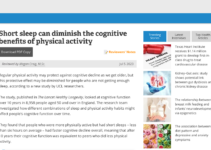The field of neuroscience has made significant strides in understanding the intricate relationship between sleep and brain function. Recent studies have shed light on the neurological regulation of sleep and the impact of sleep quality on mental health.
One study, published in the journal Cortex, emphasized the importance of high-quality sleep and positive coping strategies in preventing poor mental health outcomes. The researchers found that individuals who were able to reframe negative or stressful situations and engage in effective coping strategies were better equipped to maintain good mental health during periods of chronic stress.
Another study, published in The Lancet, compared the cost-effectiveness and clinical impact of nurse-delivered sleep restriction therapy with sleep hygiene for the treatment of insomnia. The researchers found that participants who received sleep restriction therapy reported significantly lower scores on a scale measuring insomnia severity compared to those who received sleep hygiene advice. Additionally, the sleep restriction therapy group reported greater improvements in mental health-related quality of life, depressive symptoms, work productivity, and insomnia at the one-year follow-up.
The impact of sleep on physical health cannot be understated. Inadequate sleep has been linked to worsening cardiovascular health, poor brain function, mental illness, overall poor health, and obesity.[0] Exercise has been found to improve sleep quality, highlighting the importance of physical activity in nurturing healthy sleep patterns.
Time management skills also play a crucial role in sleep quality, particularly for college students. Research conducted at the University of Alabama found that poor time management skills, particularly in organization, can lead to poor sleep quality among college students. Establishing consistent routines and prioritizing sleep can lead to better sleep duration and decreased impulsivity.[1]
Sleep patterns have also been found to have an impact on gut health.[2] A study published in The European Journal of Nutrition found a link between irregular sleep patterns, known as social jetlag, and poorer diets.[2] Consistent sleep schedules and balanced diets were recommended to reduce the risk of disease.[2]
Sleep is not only important for overall well-being but also plays a role in cognitive function and the risk of dementia. Better sleep has been linked to improved global cognition, emphasizing its potential role in maintaining cognitive function among aging adults.[3]
The circadian rhythm, controlled by the suprachiasmatic nucleus in the hypothalamus, regulates the timing of sleep.[4] The release of melatonin, cortisol hormone, and changes in body temperature are all influenced by the circadian rhythm and have an impact on sleep.[4]
The COVID-19 pandemic provided a unique context for studying the relationship between sleep and mental well-being.[5] Researchers analyzed data from the Boston College Daily Sleep and Well-being Survey and found that high-quality sleep was associated with better mental health outcomes, even during periods of intense and prolonged stress.
Insomnia is a widespread condition that negatively affects quality of life and increases the risk of developing other conditions such as psychiatric disorders, type 2 diabetes, and cardiovascular disease.[6] Despite its prevalence, access to the recommended treatment, cognitive-behavioral therapy, is limited.[6]
Overall, the research highlights the importance of prioritizing high-quality sleep and implementing positive coping strategies to maintain good mental and physical health. Consistent sleep schedules, exercise, time management skills, and healthy lifestyles all contribute to nurturing healthy sleep patterns and improving overall well-being.
0. “Sleep Disorder Information, Research & News Center | Sleep Apnea …” www.clinicaladvisor.com, 12 Sep. 2023, https://www.clinicaladvisor.com/home/topics/sleep-information-center/
1. “The impact of sleep on children's impulsive behaviour” www.openaccessgovernment.org, 12 Sep. 2023, https://www.openaccessgovernment.org/the-impact-of-sleep-on-childrens-impulsive-behaviour/165750/
2. “Study Reveals Why You Should Go To Sleep At The Same Time All …” www.ndtv.com, 12 Sep. 2023, https://www.ndtv.com/science/study-reveals-why-you-should-go-to-sleep-at-the-same-time-all-week-4264715
3. “The Importance of Sleep for Cognitive Health in Ageing Adults …” www.emjreviews.com, 12 Sep. 2023, https://www.emjreviews.com/neurology/news/the-importance-of-sleep-for-cognitive-health-in-ageing-adults/
4. “Neuroscience of Sleep” www.news-medical.net, 12 Sep. 2023, https://www.news-medical.net/health/Neuroscience-of-Sleep.aspx
5. “Got the blues? Study says you should get a good night's sleep …” www.news-daily.com, 12 Sep. 2023, https://www.news-daily.com/local/health/got-the-blues-study-says-you-should-get-a-good-night-s-sleep/article_61ff2cdb-3733-534d-a398-a5c8dce362e0.html
6. “New Oxford study shows brief sleep therapy delivered by nurses …” www.medsci.ox.ac.uk, 12 Sep. 2023, https://www.medsci.ox.ac.uk/news/new-oxford-study-shows-brief-sleep-therapy-delivered-by-nurses-improves-insomnia




![Sleep and physical activity are both important factors in maintaining cognitive health.[0] However, … Sleep and physical activity are both important factors in maintaining cognitive health.[0] However, …](https://positivebirthstories.com/wp-content/uploads/2023/08/tempZ4YtXa-211x150.png)
